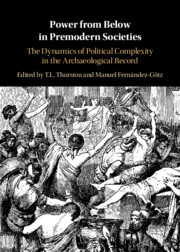 Power from Below in Premodern Societies
Power from Below in Premodern Societies All along the Watchtowers
Published online by Cambridge University Press: 08 October 2021
Literacy and the exercise of power are intimately entangled. Claude Lévi-Strauss once famously argued that, by enabling “the integration of large numbers of individuals into a political system, and their grading into castes or classes … the primary function of written communication is to facilitate slavery” (Lévi-Strauss, 1973: 299). An analogous hegemony is propagated in academic discourses that rely upon the textual products of past elites. This is especially pertinent to the study of early China, which until recently “has concentrated, expressly or not, on the relationship between exceptional individuals, elite classes, power holders, and the written word” (Sanft, 2019: 2), influenced largely by the received canon of classics, histories, and masters literature. It would be presumptuous, however, to deny non-elite agency in the power dynamics contested through literacy; and it is therefore equally imperative that our scholarship reaches beyond elite texts to accommodate non-elite actors. To these ends, this chapter examines the impact of non-elite access to scribal literacy in early China, through the analysis of an archaeological context in which manuscript fragments of a scribal primer were recovered.
To save this book to your Kindle, first ensure [email protected] is added to your Approved Personal Document E-mail List under your Personal Document Settings on the Manage Your Content and Devices page of your Amazon account. Then enter the ‘name’ part of your Kindle email address below. Find out more about saving to your Kindle.
Note you can select to save to either the @free.kindle.com or @kindle.com variations. ‘@free.kindle.com’ emails are free but can only be saved to your device when it is connected to wi-fi. ‘@kindle.com’ emails can be delivered even when you are not connected to wi-fi, but note that service fees apply.
Find out more about the Kindle Personal Document Service.
To save content items to your account, please confirm that you agree to abide by our usage policies. If this is the first time you use this feature, you will be asked to authorise Cambridge Core to connect with your account. Find out more about saving content to Dropbox.
To save content items to your account, please confirm that you agree to abide by our usage policies. If this is the first time you use this feature, you will be asked to authorise Cambridge Core to connect with your account. Find out more about saving content to Google Drive.